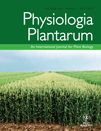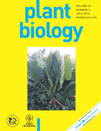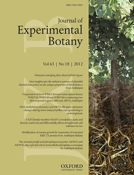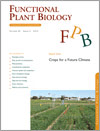
PHYSIOLOGIA PLANTARUM
Scope & Guideline
Fostering Groundbreaking Discoveries in Plant Physiology
Introduction
Aims and Scopes
- Plant Stress Responses:
Research on how plants respond to various stressors such as drought, salinity, heat, and nutrient deficiencies, exploring physiological, biochemical, and molecular mechanisms. - Physiological Mechanisms:
Investigating the physiological processes involved in plant growth, development, and adaptation to changing environmental conditions. - Molecular Biology and Genetics:
Studies focusing on the genetic and molecular basis of plant responses, including gene expression, transcription factors, and metabolic pathways. - Metabolomics and Biochemistry:
Utilization of metabolomic approaches to understand the biochemical changes in plants under stress and their implications for plant health and productivity. - Interactions with Microorganisms:
Exploring the role of plant-associated microorganisms, including mycorrhizae and rhizobacteria, in enhancing plant stress tolerance and growth. - Biotechnology and Genetic Engineering:
Application of biotechnological tools and genetic manipulation to improve plant resilience and stress tolerance for agricultural applications.
Trending and Emerging
- Multi-Omics Approaches:
There is a rising trend in the integration of transcriptomics, proteomics, and metabolomics to provide a comprehensive understanding of plant responses to environmental stresses. - Climate Change Resilience:
Research focused on the impact of climate change on plant physiology, highlighting adaptation mechanisms and strategies for improving crop resilience in changing environments. - Microbiome Interactions:
An increasing interest in the role of plant microbiomes, including beneficial bacteria and fungi, in enhancing plant health and stress tolerance. - Phytohormone Signaling:
Growing emphasis on the role of phytohormones in mediating plant responses to stress, including the interplay between various hormonal pathways. - Genetic Engineering for Stress Tolerance:
Innovative genetic engineering approaches, including CRISPR/Cas9 technology, are being utilized to develop crops with enhanced tolerance to abiotic stresses. - Sustainable Agricultural Practices:
Research is increasingly aimed at developing sustainable agricultural practices that leverage plant biology for improved resource efficiency and reduced environmental impact.
Declining or Waning
- Traditional Agronomy Studies:
There has been a noticeable decrease in publications focused solely on traditional agronomy practices, as the field shifts towards more integrated and innovative approaches that encompass molecular and genetic studies. - Generalized Stress Tolerance Mechanisms:
Research on broad, non-specific stress tolerance mechanisms appears to be waning, with more emphasis now placed on specific molecular pathways and targeted responses. - Single-Factor Experiments:
Studies that focus solely on single stress factors without considering multi-stress interactions are becoming less common, as the complexity of plant responses under multiple environmental conditions is increasingly recognized.
Similar Journals

PLANT BIOLOGY
Unveiling the Secrets of Plant EcologyPLANT BIOLOGY is a prestigious academic journal published by Wiley, dedicated to advancing knowledge in the fields of plant science, ecology, and evolutionary biology. With an impressive impact factor and ranking in the Q1 category for Ecology, Evolution, Behavior and Systematics, and Plant Science as of 2023, it stands at the forefront of research dissemination. The journal encompasses a broad scope of plant biology topics, providing a critical platform for researchers to share innovative findings and foster interdisciplinary collaboration. Available in both print (ISSN: 1435-8603) and online formats (E-ISSN: 1438-8677), it ensures accessibility through open access options. As a crucial resource for professionals, researchers, and students alike, PLANT BIOLOGY cultivates a deeper understanding of plant systems and their ecological significance, making it an essential addition to the library of anyone dedicated to the study of biology and the environment.

Journal of Integrative Plant Biology
Connecting Ideas, Cultivating UnderstandingThe Journal of Integrative Plant Biology, published by WILEY, is a premier academic journal that has been at the forefront of advancing research in plant biology since its inception in 2005. With a notable impact factor and a robust Scopus ranking—positioned at #7 out of 516 in Plant Science and #18 out of 438 in Biochemistry—this journal is recognized as a Q1 journal in multiple categories, including Biochemistry and Plant Science. The journal aims to bridge the gaps between various disciplines in plant research, emphasizing integrative and interdisciplinary approaches to understanding plant biology. With options for open access, the Journal of Integrative Plant Biology ensures broad visibility and impact of research findings, making it an invaluable resource for researchers, professionals, and students looking to stay informed on innovative advancements in the field. Its headquarters are located in the United Kingdom, further amplifying its reach within the global academic community.

Frontiers in Plant Science
Pioneering research that cultivates knowledge and collaboration.Frontiers in Plant Science is a premier open-access journal dedicated to advancing the understanding of plant biology, covering a broad spectrum of topics including physiology, ecology, and biotechnology. Published by FRONTIERS MEDIA SA in Switzerland, this journal has established itself as a key resource in the field of plant science, boasting an impressive impact factor and ranking in the Q1 category for plant science as of 2023. With its Scopus rank of 61 out of 516 in both Agricultural and Biological Sciences, the journal is recognized for its quality and relevance, being in the 88th percentile among its peers. Since its inception in 2010, Frontiers in Plant Science has embraced an open-access format, ensuring that cutting-edge research is readily available to scientists, professionals, and educators around the globe. The journal aims to foster innovative research and collaboration within the plant science community, making it an essential publication for those looking to stay at the forefront of the discipline.

JOURNAL OF PLANT RESEARCH
Advancing Sustainable Practices Through Plant Research.JOURNAL OF PLANT RESEARCH, published by SPRINGER JAPAN KK, is a leading academic journal that has carved a niche in the field of Plant Science. With its ISSN 0918-9440 and E-ISSN 1618-0860, this journal has been disseminating high-quality research since its inception in 1993 and continues to be essential reading for academics and practitioners alike, aiming to bridge the gap between innovative plant research and practical applications. The journal is highly regarded, holding a prestigious Q1 ranking in Plant Science for 2023, and is positioned in the top 80th percentile within the Scopus rankings for Agricultural and Biological Sciences. The journal's coverage includes a wealth of topics pertinent to advancing our understanding of plant biology, ecology, and sustainable agricultural practices. Although it operates under a subscription model, its influence in the research community remains profound, making it a vital resource for contemporary studies in plant-related disciplines.

ACTA PHYSIOLOGIAE PLANTARUM
Fostering impactful discussions on plant health and sustainability.ACTA PHYSIOLOGIAE PLANTARUM, published by Springer Heidelberg, is a leading journal dedicated to advancing the fields of Agronomy, Plant Science, and Physiology. With an ISSN of 0137-5881 and an E-ISSN of 1861-1664, this esteemed publication has a significant global outreach, being based in Germany. The journal is recognized for its impactful contributions, currently holding a Q2 ranking in both Agronomy and Crop Science, as well as Plant Science, and a Q3 ranking in Physiology according to 2023 category quartiles. Its Scopus rankings reflect its reputable standing within the academic community, with notable placements in Agricultural and Biological Sciences, further highlighting its importance for researchers and professionals in the field. The objective of ACTA PHYSIOLOGIAE PLANTARUM is to foster robust discussions and disseminate innovative studies that enhance our understanding of plant physiology and its applications. Though not an open-access journal, it provides comprehensive access options for readers keen on exploring cutting-edge research that drives advancements in agricultural productivity and sustainability. Through its dedication to excellence, this journal continues to be a vital resource for advancing knowledge and practices in plant sciences.

Horticulturae
Advancing Horticultural Science for a Sustainable Future.Horticulturae, an esteemed open-access journal published by MDPI, is at the forefront of horticultural science, showcasing innovative research and advancements in the field since its inception in 2015. With its base in Switzerland, this journal operates under the ethos of global accessibility, allowing researchers, professionals, and students to share and disseminate critical findings without barriers. Horticulturae holds a distinguished Q1 ranking in Horticulture and Q2 in Plant Science, as reported in the 2023 categorizations, highlighting its impactful contributions to the scientific community. The journal features rigorous peer-reviewed articles covering a wide range of topics, including plant physiology, crop production, and sustainable practices, making it a vital resource for anyone engaged in gardening, agronomy, and environmental science. As it converges its focus from 2015 to 2024, Horticulturae not only aims to further academic discourse but also aligns with the growing need for research pertaining to biodiversity and sustainable agriculture, thus ensuring relevance in an ever-evolving field.

Nature Plants
Advancing Plant Science for a Sustainable FutureNature Plants is a premier journal dedicated to the dynamic and interdisciplinary field of plant science, published by NATURE PORTFOLIO in the United Kingdom. With an impressive impact factor placing it in the top tier of scholarly journals—ranking Q1 in Plant Science for 2023—this journal sets a high standard for research dissemination. Nature Plants has maintained a remarkable Scopus Rank of 5 out of 516 in the Agricultural and Biological Sciences category, reflecting its pivotal role in advancing knowledge in the field. The journal aims to provide a platform for groundbreaking research that addresses key challenges in plant biology, ecology, and agriculture, thereby fostering a deeper understanding of plant science's contribution to global sustainability. Although primarily non-open access, it offers exclusive insights and robust discussions, making it an indispensable resource for researchers, professionals, and students eager to explore the latest advancements and innovations in plant science.

Current Plant Biology
Illuminating the Path of Plant DiscoveryCurrent Plant Biology is a distinguished peer-reviewed journal published by ELSEVIER, focusing on the dynamic and rapidly evolving field of plant sciences. Since its inception as an Open Access publication in 2014, it has established itself as a leading platform for innovative research, boasting a remarkable Impact Factor that underscores its relevance and contribution to the scientific community. Based in the Netherlands, this journal caters to a diverse audience of researchers, professionals, and students, facilitating the dissemination of key findings in an array of disciplines including biochemistry, genetics, cell biology, and developmental biology. Recognized for its rigorous standards, Current Plant Biology holds a prestigious standing, classified within the Q1 and Q2 quartiles of various Scopus categories, reflecting its impact and reputation in the realms of Plant Science and related fields. The journal is committed to providing accessible and high-quality research outputs that inspire further investigation and collaboration in plant biology.

JOURNAL OF EXPERIMENTAL BOTANY
Advancing the frontiers of plant science.JOURNAL OF EXPERIMENTAL BOTANY, published by Oxford University Press, stands as a premier journal for researchers and professionals in the fields of plant science and physiology. With an illustrious history dating back to 1950, this journal has established itself as a critical resource for advancing our understanding of plant biology and its applications. It is recognized in the top tier of academic publishing, reflected in its Q1 rankings in both Plant Science and Physiology for 2023, and boasts impressive Scopus rankings—placing it in the 96th and 91st percentiles of its respective categories. Though not an open-access journal, it ensures widespread access to groundbreaking research aimed at unraveling the complexities of plant functions and adaptations. As we look toward 2024, the JOURNAL OF EXPERIMENTAL BOTANY continues to play an essential role in fostering innovation, collaboration, and education within this vital area of science.

FUNCTIONAL PLANT BIOLOGY
Innovating Solutions in Functional Plant BiologyFUNCTIONAL PLANT BIOLOGY is a prestigious academic journal published by CSIRO PUBLISHING, specializing in the dynamic fields of Agronomy and Crop Science as well as Plant Science. With an ISSN of 1445-4408 and an E-ISSN of 1445-4416, this journal provides a platform for innovative research that addresses key challenges in plant functional biology, ranging from genetics and physiology to ecological interactions. As evidenced by its impact factor and competitive rankings, including Q1 in Agronomy and Crop Science and Q2 in Plant Science, FUNCTIONAL PLANT BIOLOGY holds a significant place in the scientific community, ranking in the top tiers of Scopus for both categories. The journal supports open access options, ensuring that critical research is widely disseminated and accessible to researchers, professionals, and students around the globe. With a publication history spanning from 2002 to 2024, the journal continues to foster the advancement of plant science, making significant contributions to sustainable agricultural practices and ecological research in Australia and beyond.